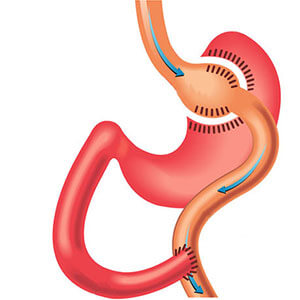With years of experience in the field, our Turkey cosmetic surgery clinic is committed to providing exceptional medical care and life-changing gastric bypass in Turkey for those struggling with obesity. If you're considering gastric bypass or secondary gastric bypass surgery in Turkey, our team of skilled professionals is here to guide you through the process and support you on your weight loss journey.
We’ll get back to you within one business day (via e-mail & WhatsApp)
The Roux-en-Y gastric bypass is an effective procedure that helps individuals achieve significant and long-lasting weight loss results. This surgery involves creating a small pouch in the stomach and connecting it to the small intestine, bypassing a portion of the digestive tract.
By reducing the size of the stomach and rerouting the digestive system, the Roux-en-Y gastric bypass restricts the amount of food you can eat and alters the absorption of nutrients, leading to weight loss. This procedure is known for its effectiveness in improving obesity-related health conditions, such as type 2 diabetes, high blood pressure, and sleep apnea.




When it comes to gastric bypass surgery, Turkey offers an attractive option in terms of affordability without compromising on quality. At Badge Clinic, we understand that cost is an important consideration for patients seeking weight loss solutions. Compared to the United Kingdom, Turkey offers competitive prices for Turkey gastric bypass surgery, making it a popular choice for medical tourists.
By choosing gastric bypass surgery in Turkey, you can benefit from significant cost savings without compromising on the quality of care. Our clinic is equipped with state-of-the-art facilities and staffed by experienced surgeons who prioritize patient safety and well-being. We can also offer secondary gastric bypass surgery in Turkey and gastric sleeve surgery in Turkey, if required.
Gastric bypass surgery is a viable option for individuals who have struggled to lose weight through other methods such as diet and exercise. If you have a body mass index (BMI) of 40 or above, or a BMI of 35-40 with obesity-related health conditions, a gastric bypass in Turkey may be a suitable solution for you.
If you have attempted other weight loss methods without success or experienced significant weight regain after previous attempts, gastric bypass surgery or a procedure for a gastric balloon in Turkey can provide a long-term solution.
Take the first step towards a healthier future by considering gastric bypass surgery in Turkey. Contact Badge Clinic today to schedule a consultation and explore the life-changing possibilities that await you.


Weight loss progress varies from person to person after gastric bypass surgery. The most significant weight loss typically occurs within the first three months. During this period, individuals usually lose at least 20 percent of their excess body weight. At the one-year mark, the weight loss can range between 50 to 100 percent, depending on adherence to the program. As you approach your weight loss goal, the rate of weight loss will slow down to approximately one to three pounds per week. It’s important to note that men often experience faster weight loss than women.
For overweight women, weight loss can improve fertility. We advise women to wait for a year to 18 months after surgery before attempting pregnancy. It’s crucial to discuss pregnancy plans with both your surgeon and obstetrician before undergoing the surgery. Following the recommended waiting period, women can have a normal pregnancy.
Dumping syndrome can occur after gastric bypass surgery when your body becomes less tolerant of refined sugars or high-fat foods. Consumption of these foods triggers the pancreas to secrete insulin, leading to fluid being drawn into the intestine. Symptoms of dumping syndrome include sweating, nausea, dizziness, tiredness, cramps, and diarrhea. These symptoms usually last for approximately 30 to 90 minutes, depending on the type and quantity of food consumed. While not life-threatening, dumping syndrome can be uncomfortable, resembling flu-like symptoms.
After the procedure, your body may not effectively absorb certain vitamins and minerals, including Vitamins B6, B12, Folate, calcium, and iron. To meet the recommended daily requirements, we strongly recommend taking two multivitamins with minerals and calcium citrate daily, along with a weekly dose of Vitamin B12 under the tongue for the rest of your life.
Significant weight loss can result in excess sagging skin. Post-bariatric surgery is a procedure that addresses this issue by tightening the body contours, providing a more natural and youthful shape. It involves various procedures such as thigh lift, neck lift, arm lift, and tummy tuck, targeting specific areas with loose skin. Depending on the extent of excess skin, multiple sessions may be required. For more information, please visit our Postbariatric Surgery page.